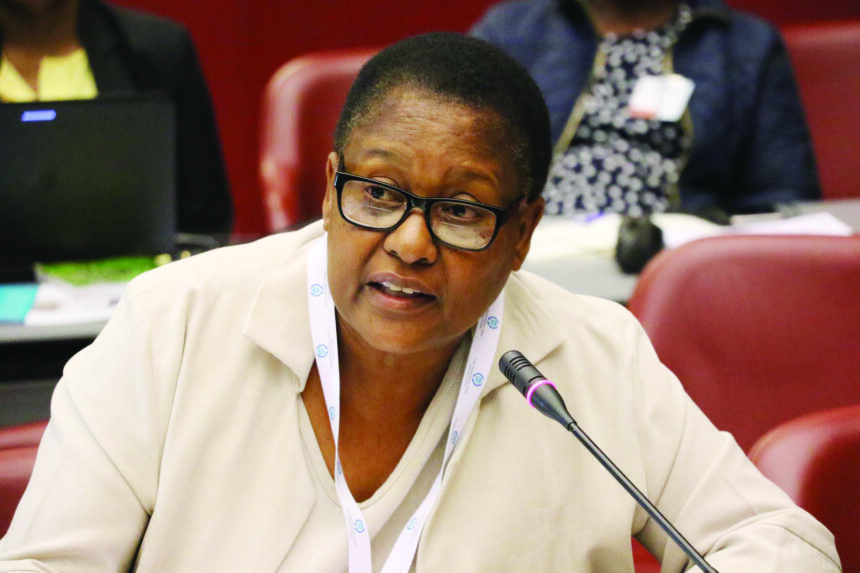Despite a travel embargo imposed on Popular Democratic Movement lawmakers by leader McHenry Venaani, some members have seemingly defied the order.
Earlier this month, in a message shared on the party’s WhatsApp group, Venaani banned party members of parliament [MPs] from travelling outside the country, unless it was on the movement’s mission or sanctioned by the
leadership.
“We had enough sightseeing; let’s focus on our work at hand. If you travel deliberately, cxqonsider yourself fired,” Venaani warned in the leaked message.
The opposition leader embargoed travelling until the elections are done in November, adding that he also has cancelled his own travels to the Pan-African Parliament (PAP).
“This movement to some has become sightseeing and Daily Subsistence Allowance-raking until leaders discuss it with parliamentary staff,” he added.
Despite the directive, party chief whip Elma Dienda and another MP, Loide Iipinge, stepped out of the country recently, with Dienda going to Zambia and Iipinge to Uganda with parliamentary committees.
Messages shared with this reporter from the party’s group show that their defiance left Venaani an angry man.
“Why are we travelling without seeking approval? Why don’t we like peace? The directive is clear; let’s go seek a mandate with the people,” he argued.
He then warned that if they underperform at the electoral college, they must blame themselves.
An insider revealed that party vice president Jennifer van den Heever and shadow health minister Winnie Moongo also travelled after the restriction was imposed, which has led other MPs to do the same.
Rules
Approached for a comment, Venaani said the rule is clear, and it’s that people must seek approval before travelling.
“Those who went without approval, I believe, know what they are doing. But the directive is that we need to prioritise the electorate,” he stated.
Asked if the restrictions will not negatively impact MPs’ committee work, Venaani justified that important trips are prioritised and need to be approved. However, in many cases, many trips are understudy conferences, or workshops on capacity-building.
“You can literally understudy or build capacity on your desk. I am supposed to be in South Africa for two weeks, and I had to cancel my trip because I cannot go to South Africa for the PAP meeting because the people of this country are too dear to me,” he reiterated.
Dienda did not respond to questions sent to her this week, while Iipinge refused to comment.
Globetrotting
Last year, New Era extensively reported on concerns about frequent and excessive travelling by National Assembly and National Council officials and MPs over the years.
The MPs’ global trips have raised questions about whether they are relevant to the nation and the work of the lawmaking chambers, or merely just sightseeing.
A member of parliament who asked for anonymity said many parliamentarians miss crucial parliamentary committee sessions, and only show up for work when there is deliberation about trips.
“Many do not take those sessions seriously, and when they travel, they don’t contribute to critical discussions or raise issues about the country; it’s merely for S&T,” the MP added.
He gave an example of his trip to Angola, in which he said his S&T alone was N$100,000.
“Now, imagine a trip to China,” he said.
In the previous financial year, the National Council spent N$26 million on daily subsistence and travel allowances (S&T) for MPs and officials, while N$75 million was spent on salaries and other benefits.
This is out of the N$120 million that was allocated that year.
New Era couldn’t obtain figures for the current financial year, despite a request.
Graham Hopwood, the Executive Director of the Institute for Public Policy Research (IPPR), opined that parties should be far more selective about which foreign trips they take up in general.
“MPs first and foremost should be attending to their duties in Parliament—both in the chamber, and through the committee system. One of the problems with the proportional representation system is that MPs are not representing constituencies and, therefore, do not have to attend to the needs of constituents when not in Parliament,” he observed.
Hopwood said all parties should control foreign trips so that MPs only go on those that really bring benefits to the party and the country.



